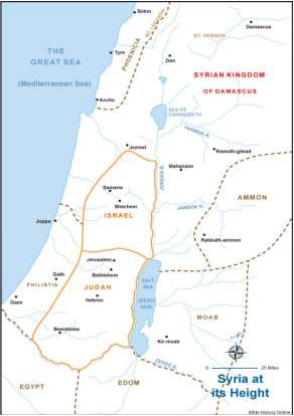Judgement on Judah (4 & 5): This judgment is not about their atrocity against any nation or people, but for breach of covenant (Law) of YAHWEH. …despised the law… They have disregarded,rejected, considered it to be unimportant or even worthless..…lies… The lies are the ungodly ways and false gods or something that was god. You don’t see much wrong in it; but eventually it will lead us in to sin. The punishment is destruction of Jerusalem by fire, which was fulfilled in the year of 587 B.C. through Babylonian invasion.

Judgement on Israel (6-16): There are five addresses in total regarding the judgment on Israel 2:6-16, Ch. 3, Ch. 4, 5:1-17 and 5:18-6:14. It is easy to imagine that up to this point Amos’s preaching had met with an enthusiastic response.
Address 1:
The first address is found in 2:6-16. Amos establishes the fact that Israel also is guilty before God and the judgement of God is upon them also.
V. 6:…Sell the righteous…This may refer to “false witness for money.”The specific sin of Israel is alienating the people from God, by removing justice and righteousness. God is condemning them for their social injustice rather than idolatry, because idolatry precedes social injustice.
V. 7:…dust…which is on the head of the poor…This is a reference to the perverted justice. The courts oppressed the poor instead of defending them. Same girl…to defile My Holy Name… This girl may be a cultic/temple prostitute or a slave girl forced to be concubine for a man and his father. Both are forbidden by the law (Incest: deut. 22:30 & Ritual Prostitute 23:17-18).
V. 8:…clothes taken in pledge…This is a pawned one which is not to be used but returned that evening. …drink the wine of the condemned in the house of their god… refers to social injustice, debauchery in their worship system.
Vs. 9-11: God reminds Israelites of what He has done for them.
V. 9… it was I who destroyed Amorites…They could not have destroyed the pre-Israelite inhabitants of Canaan.
V. 10… brought you up from the land of Egypt… led you forty years…It was God who brought them out of bondage, and guided them in the wilderness.
V. 11… I raised up…prophets…Nazarites…God raise God raise religious leaders and warriors among them. The above acts of God refer to the historical relationship upon which the covenant is based.
It is God who, through Jesus Christ, brought us out of bondage of sin, and made room for us to live in this world. He has also given us the new covenant teaching through Apostles.
V. 12… made Nazarites to drink wine and commanded prophets…you shall not prophesy…The Israelites refused God establish system by shutting up the prophets and by compromising the Nazarites.
V. 13… I will press you down… So, God will make the Israelite like an animal run over by a heavily loaded cart.
Vs. 14-16: Successive scenes of the powerlessness of men. God, through Amos, presents successive scenes of the powerlessness of men too frightened to function properly. Yahweh will render them helpless. No one will be able to escape the coming destruction.
1. Who runs fast shall not find refuge (14),
2. Strong shall not retain his strength (v. 14),
3. Mighty shall not save his life (v. 14),
4. Man who handles the bow shall not stand (v. 15),
5. Man who is swift of foot shall not save himself (v.15),
6. Horseman shall not save his life (v. 15),
7. Stout of heart shall flee away (v.16).
Amos 3: Address 2, oracle of warning.
V. 1… Hear this Word… The oracles of warning in Chs. 3,4,&5 are introduced with the words “Hear this word” (3:1, 4:1, and 5:1). The 5th address (5:18-6:14) has repetition of the word “Woe” (5:18, 6:1, 6:4). These warnings are directly addressed to the people of Israel.
V. 2… You only have I known…
It seems clear that Israel and Judah believed that their role as the chosen people of God would protect them from harm (see note on Amos 5:18–20). Amos says that the very opposite is true. It is precisely because God has known them as he has known no other nation that they are being judged according to a higher standard (see Luke 12:48). – ESV Study Bible.
The Hebrew expression of the word “know” is more than intellectual or mental knowledge. The knowledge of God about Israel is different from God’s knowledge on other nations. Here it involves sympathy and care. God’s intent was to save and bless the world through Abraham’s seed. Because of this relationship Israel has greater and special responsibility.
Vs. 3-8… There are series of questions to show the imminent disaster for Israel.